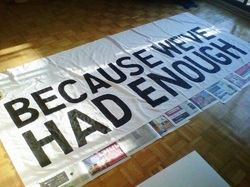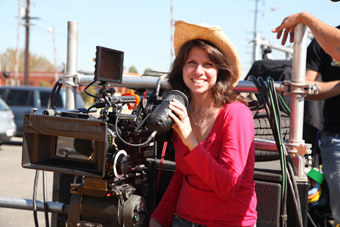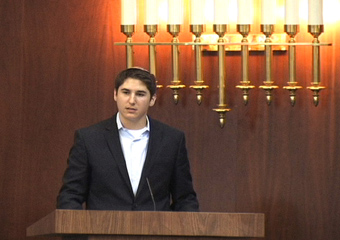A girl’s sexual status is a metaphor for how well she fits into the American ideal of femininity.
–Leora Tanenbaum, author of “Growing Up Female With A Bad Reputation, Slut!”
.jpg)
When I was 10 years old I bought a pin that said, “Trust in God. She’ll provide.” From an early age, I was a self-declared feminist.
I grew up in a house of all women, as one of three daughters, and early on, I became aware of the complexities of gender, with parents maintaining very traditional gender roles, while encouraging us girls to grow up and become president some day—as long as we got married…to a doctor, or a lawyer. None of us are president yet, but we are all feminists. I have my oldest sister to thank for introducing me to feminism at a young age. She was starting college at the time and had discovered the women’s studies program at her school. She came home aglow with information for me. I later followed in her footsteps and got a women’s studies minor at college.
Being a feminist takes on a different meaning for each woman who ascribes to feminist theories, and the movement itself doesn’t judge or measure. However, I do think a little knowledge is a powerful thing. Many young girls and young women accept misogyny, objectification, slut-bashing and even rape as normal elements of society because they can’t put their finger on why they shouldn’t. It’s everywhere. As the feminist phrase goes, “The personal is political.” Perhaps we need to check in with ourselves and with society around us more frequently than we actually do.
As Jewish people celebrate Israel’s independence this month and prepare for Israel Solidarity Day featuring the Walk with Israel at the beginning of June, another walk is under way—a march, in fact.
The level to which women have been “liberated” in America has room for improvement. Canada recently sounded the alarms and the world is listening. Canadians were outraged when a representative of the Toronto police service this past January told women they should avoid dressing like sluts in order to not be victimized. This statement sparked the organization of the first-ever SlutWalk, a sexual assault awareness event, April 3, 2011 in Toronto.
The SlutWalk movement caught on like wildfire in a matter of four and half months and satellite SlutWalks are now being organized all over the world, including in our own backyard—and two vocal Jewish women are behind it. Slutwalk Chicago, which is scheduled to take place from 12 to 3 p.m., Saturday June 4 in Chicago’s loop is being organized by Jewish Chicagoans and co-founders Jessica Skolnik, 32, and Jamie Keiles, 19.

.JPG)
“I think we make a pretty great team!” Jessica says. “I'm an older grump who cut her teeth on riot grrrl and Jamie is a whip-smart younger woman who has tons of ideas and enthusiasm.”
Jessica, a DC area native, is a survivor of sexual assault and has been involved with feminist and labor organizing and activism for more than 15 years. Jamie, a first year at the University of Chicago and a Pennsylvania native, is known for her social experiment “The Seventeen Magazine Project,” (a blog project examining the messages in the teen magazine). She’s working on her first book, a guide to media and culture for teens.
Jessica and Jamie met over the blogosphere and decided to join forces in organizing the walk. More than 2,500 people have RSVP’ed on SlutWalk Chicago’s Facebook page.

Check out my interview with Jessica below:
Why is it so hard for society to get rid of the “slut” label? What does it mean for a 2011 population to “reclaim the word ‘slut’”? What signs will we see when we’ve made progress?
The word "slut" has been thus far a pretty effective way to judge and control the sexual behavior and bodies of marginalized people, which is why I believe it's stuck around so long. Nasty and systemic stuff.
I actually am not personally invested in reclaiming the word 'slut'… I'd like the concept to disappear off the map entirely, as I don't think "sluts" exist (nor do "prudes," on the other end of the spectrum). It'd be really beautiful and liberating to live in a world free of judgments about others' consensual sexual choices and behavior, and that's the world I'm pushing toward.
Is the main focus of the march raising awareness about sexual assault and perceptions, or is there a larger mission about how society perceives women?
It's really both, which is something that can be hard to communicate sometimes. I do believe that the SlutWalk name has the ability to kindle a discussion about the connection between sexual double standards and victim-blaming in a culture that normalizes rape as "just something that happens" and implies that experiencing a rape [is] something the survivor should be ashamed of.
SlutWalk’s mission statement talks about “uniting people across diverse populations.” What types of groups has that included and what groups are you hoping to reach?
We'd really like to reach people across all boundaries—across class lines and color lines, regardless of gender or sexual self-identification, regardless of ability, regardless of creed or religion.
In what ways is this cause personal for you?
I was assaulted by acquaintances at 13 and date-raped at 18, and in both cases had the support of my parents and a few friends but was really hurt by authority figures who were "supposed" to help and support me. I filed a police report at the encouragement of my school counselor when I was 13; my report was never followed up on and the officers who took my statement were extremely judgmental towards me, implying that I had brought the assault on myself because I hadn't been a "good girl." When I was 18, I reported what had happened to me to the college I was attending and was only offered a "mediation" with the people involved in the assault (who refused to be part of it); I still had to share the (small) campus with them until I transferred schools (which I did as soon as possible). (There's more to both stories, but I'd rather not go into the gory and triggering details.) I've seen the system fail over and over again for myself and other survivors. I've had the nastiest slurs hurled my way because of what I've survived. If there was ever a cause for me that was deeply ingrained in my experiences, this is it.
Do any of these efforts fit into your identity as a Jewish woman? What would you hope Jewish women took away from the message of this walk?
My family is Jewish in heritage but I was not raised observant; my ties are mainly cultural. I've always really identified with and liked the fact that there is such a sense of community responsibility and support in the Jewish community, and I see that reflected in this walk. This march is an educational one, one that hopes to push cultural boundaries toward more respectful, thoughtful and healthy territory.
Why do you think the message of this walk is important for a Chicago audience and also for uniting Chicagoans?
First of all, Chicago is a huge and diverse (if not notably stratified and segregated) city with a storied history of socially progressive activism. We've got a lot of really amazing allies in the Chicago area and we're really excited about a coalition of activists and general citizens meeting up and learning from one another at this event.
Secondly, this event feels particularly timely in light of some of the news we've seen recently (the Tiawanda Moore case, for instance, which goes to trial right before the walk, or the Rogers Park police sexual misconduct/assault case) throughout the city. There's never an inappropriate time for an event like this, as (unfortunately) the theme is always resonant, but it happens to be something that's been in the headlines here as well.
Which communities/people do you find are most risk of sexual assault and why?
Honestly, I don't believe that any one community is more at risk than another. Sexual assault is unfortunately something that happens across many different types of boundaries, which is one reason we're so invested in this being an equitable movement that is accessible to all. The thing is, sexual assault isn't about sex, it's about power and control, about gaining a sense of power through the humiliation and pain of another human being—so those who are most at risk are often those who in most situations have less power or are more marginalized because we're viewed as more vulnerable.
Can you talk more on the idea of a culture that teaches “don’t get raped” as opposed to “don’t rape,” mentioned in your literature?
One of the main problems with telling people how to behave in order to not get raped (besides the fact that it's based on myths about what sexual assault looks like, why it's perpetrated and how it occurs) is that it puts the responsibility for the assault onto the survivor as much as the perpetrator. It also presupposes that that's just "how things are," that it'll never change, and that there's no problem with the way things are—when there is very clearly a problem with a world in which women's personal choices, bodies and clothing are policed, and in which simply being a woman in public space is perceived as an invitation to harassment and possibly assault. Moving the responsibility onto the perpetrator—and ONLY the perpetrator—is thus both not only the just response but a mark of a cultural shift away from shame and toward healthy and open discussion of human sexuality as well as sexual violence (though they both contain references to sex, it bears reiterating that sexual violence actually has nothing to do with sex as a motive—sex is a tool in that case used to overpower and control another person). Too many of us aren't taught what it means to make an informed choice to engage in sexual behavior and what crossing the line into nonconsensual behavior looks like.
What do you hope for the next generation?
I'd love to see a world in which consent training is taught in schools as part of sex ed, where nobody is afraid to occupy public space for fear of harassment, where young women aren't taught to compete and to tear one another down, where harmful gender binaries aren't reinforced over and over again by pop culture. I'd hope for thoughtful and nuanced conversation around these topics instead of hate speech and mudslinging. That's probably one hope too far, but, you know, dream big.
I'd also like to see education about sexual assault survivors' support and consent for lawmakers, for lawyers, for medical professionals, for school counselors and psychiatrists, for police—for anyone in a position of authority who might touch a survivor's (or potential survivor's) life. I'd love to see really thoughtful conversations focused on support and understanding come from this march.
As mentioned on Toronto site, they hope this conversation continues. Do you hope that for Chicago too? In what ways do you plan to put that in place?
Absolutely. We hope to continue the conversation through a blog but also through broader coalition-building and further programs with other organizations; one of the projects I'm personally hoping to work on is a consent training curriculum and program with the SHEER Collective.



.jpg)




.jpg)



